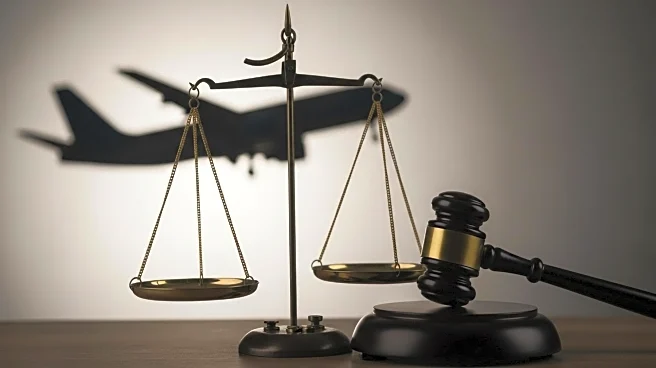What's Happening?
Families of victims from two Boeing 737 Max crashes are set to make a final plea for criminal prosecution against Boeing. A federal judge in Texas will hear arguments on a motion to dismiss a felony charge against Boeing, which was accused of conspiracy to commit fraud related to the crashes that killed 346 people. Boeing had previously reached a settlement in 2021, protecting it from criminal prosecution, but the Justice Department revived the charge last year, alleging Boeing deceived regulators about a flight-control system implicated in the crashes. The judge's refusal to accept Boeing's plea agreement has allowed the company to challenge the rationale for the charges, leading to a renegotiated plea deal. The government has proposed dismissing the charge in exchange for Boeing paying $1.1 billion in fines and compensation, citing significant changes in Boeing's quality control and anti-fraud programs.
Why It's Important?
The outcome of this legal battle holds significant implications for Boeing and the aviation industry. A decision to prosecute could lead to severe financial penalties and reputational damage for Boeing, affecting its business operations and investor confidence. The case also highlights the importance of corporate accountability and regulatory oversight in ensuring aviation safety. Families of the victims are advocating for justice and accountability, emphasizing the need for transparency and reform in Boeing's practices. The decision could set a precedent for how corporations are held accountable for safety failures and fraud, impacting future regulatory and legal actions in the industry.
What's Next?
The judge will hear from families of the victims, who are urging the court to deny the government's request and appoint a special prosecutor. The Justice Department has asked to preserve the option of refiling the conspiracy charge if Boeing fails to comply with the non-prosecution agreement over the next two years. The legal proceedings will continue to unfold, with potential implications for Boeing's operations and the broader aviation industry. Stakeholders, including regulators, industry experts, and advocacy groups, will closely monitor the case for its impact on corporate accountability and aviation safety standards.








